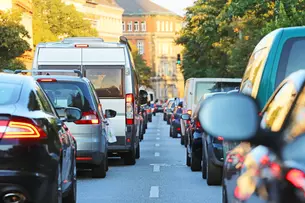City logistics: examples of successful cooperations
Online retail and increasing traffic in cities pose major challenges for city logistics. Things are getting tighter and tighter on the last mile. The solution: more co-operation!Read how city logistics is facing up to change with shared infrastructure, networked technologies and empowered consumers.
City logistics is facing challenges
In 2024, the volume of courier, express and parcel shipments will only grow slightly. Wars in Ukraine and the Middle East are currently slowing down economic development. But things could get tighter again on the last mile as early as 2025. Forecasts promise an economic upturn in Germany and in important foreign markets. The CEP Study 2024 (BPEX), for example, expects 4.7 billion shipments by 2028. Courier, express and parcel service providers will have to share the limited space with delivery services, freight forwarders and many others. This is a challenge that requires holistic solutions.

Examples of innovative solutions for city logistics
Clean, bundled and without congestion—the last mile not only needs clever solutions, but also a joint approach. To achieve this, the federal government, federal states and municipalities must provide space where new technologies and approaches can be tested in a cooperative manner.
These include, for example, from short to long term:
- Parcel machines
- Transport and delivery robots
- Alternative modes of transport such as trams, waterways, underground pipe systems
- Hub solutions in urban areas
- Integrated neighbourhood logistics
The future: joint solutions for city logistics
The future of logistics always lies in shared responsibility, according to the tenor of many previous forums at transport logistic in Munich. As early as 2019, Hamburg Senate Director Lutz M. Birke stated in a forum discussion: “We can't change everything with one big bang.” His region was a pioneer in new solutions such as parcel robots, which are currently being trialled unaccompanied, and drones that fly back and forth between hospitals and laboratories with tissue samples. But despite a progressive attitude, progress is only being made in small steps. Why? Because it takes time for everyone involved to pull together. And despite increasing pressure, this is still one of the most important prerequisites.
The consumer also bears responsibility
The end consumer bears part of this shared responsibility. They decide, for example, whether they need the goods within a few hours as same-day delivery or whether they can wait a little longer in favour of the price and possibly walk to the parcel station. This makes a big difference in the logistics chain. In the long term, consumers will have to develop an awareness of how consumer behaviour influences logistics—this applies to online orders just as much as in bricks-and-mortar retail.
Cooperation as a natural part of planning
Municipalities, logistics service providers and technology providers - many different players need to work together when it comes to collaborative logistics solutions. Only the joint utilisation of capacities and hubs can reduce the volume of traffic and increase efficiency.This is a decisive factor.It is important that the idea of co-operation is part of the planning from the outset and as a matter of course.
The advantages:
- Logistics can automatically be part of the concept in neighbourhood development.
- Local authorities could play a greater role in this by providing their own land or incentives for businesses and utilising existing infrastructure such as railway stations or car parks.
- make better use of existing infrastructure such as railway stations or multi-storey car parks.
Examples of successful city-logistics cooperation
A pioneer and prime example of successful cooperation was the KoMoDo project launched in 2018 in Berlin's Prenzlauer Berg neighbourhood.For this approach, the five largest parcel delivery services DHL, DPD, GLS, Hermes and UPS organised a micro-hub for cargobike deliveries on a municipal site.It was one of the first co-operations of its kind.During the project period of ten months, 128,000 parcels were delivered using cargo bikes and 23,000 car kilometres were saved. Even though this depot has since been dismantled, the principle has set a precedent.
Micro-depots now scientifically substantiated
A study commissioned by the Senate Department for the Environment, Mobility, Consumers and Climate Protection (SENUMVK) in the state of Berlin investigated how effective inner-city hubs are or can be. The final report in March 2023 sees potential and many individual approaches in the interaction between private companies and the public sector, small and large players in the context of single and multi-user concepts. This knowledge can be used for the rapid implementation of future micro-depots and the preceding needs assessment.
Conclusion: Cooperation as an opportunity for city logistics
With 4.18 billion courier, express and parcel shipments (CEP), almost 50 shipments per capita were sent in Germany in 2023. And the trend is rising. With more stringent framework conditions, from climate change to a shortage of skilled labour and space, the time of small-scale promotion of specific individual solutions is finally over.
The idea of co-operation is becoming more and more prevalent.From now on at the latest, logistics must play a role in neighbourhood development from the outset.This includes platforms on which consignments can be bundled, hubs for consignment handling and areas for vehicles, technologies and systems. All of this needs space. Early involvement of all stakeholders, fast approval processes and test areas for new technologies and systems are essential. And one thing is a fact: traffic in our city centres will not decrease.
More information?
Would you like more information on the topic of city centre logistics? Then these articles may also be of interest to you:
